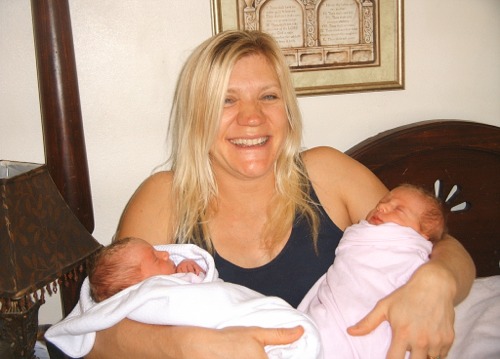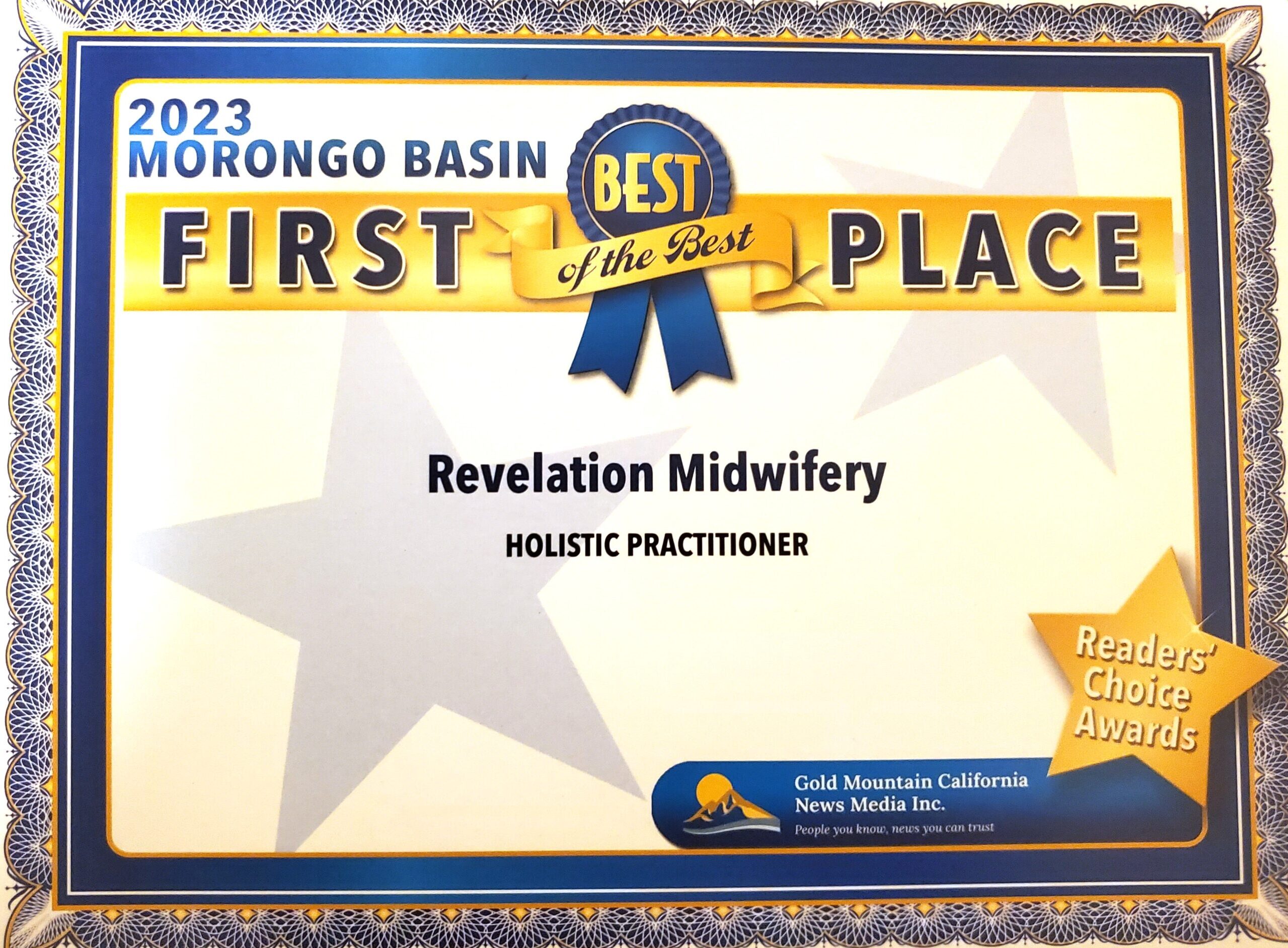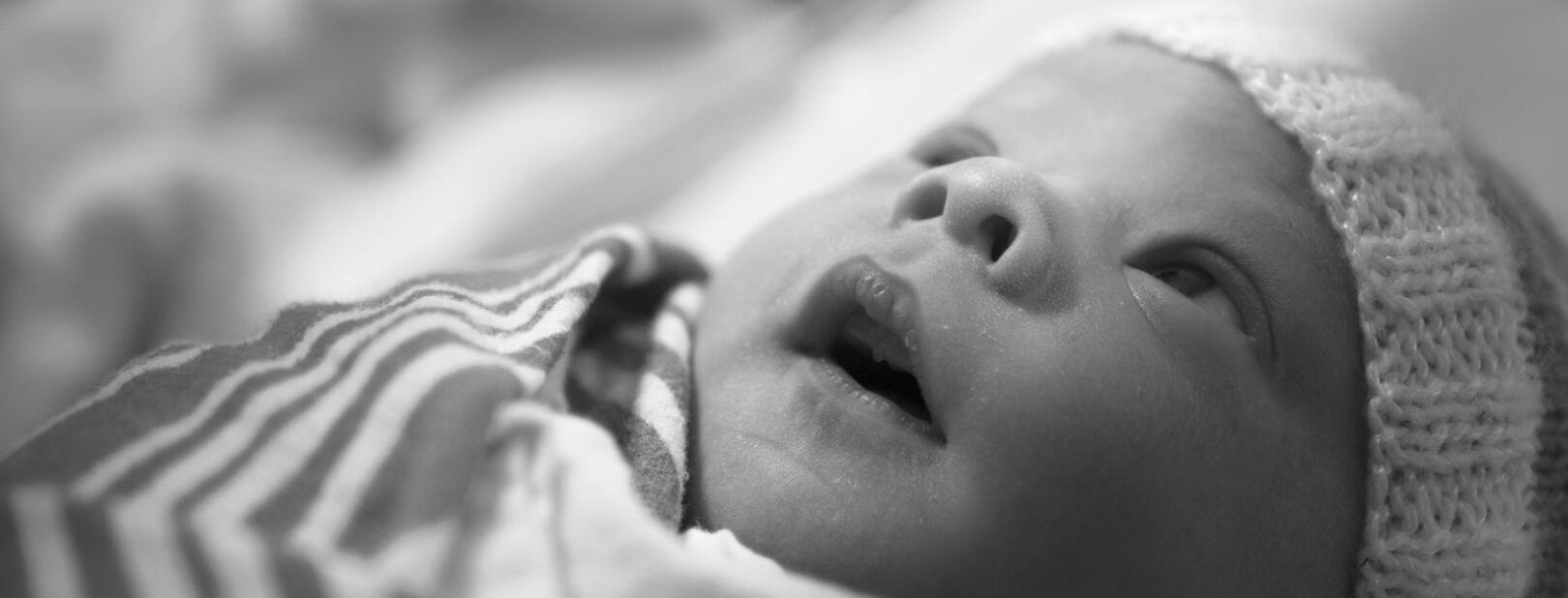Personal Interview
When a woman inquires about midwifery services I usually provide a brief description and an interview is scheduled if she wants to know more. The pregnant woman and her partner meet with me at the office for a one to two hour visit. During that time, I share my background and training and philosophy of care and discuss what it would be like to work with me. The couple will ask all their questions and tell me what is important to them. We do a health history and a history of previous pregnancies and births. This helps me to know whether or not the woman would be well served by having a home birth or whether it would be wiser to seek a medically managed pregnancy and birth. There is no charge for this visit and there is no commitment expected at this visit. Later, if the woman decides to work with me, she will call me and schedule a prenatal visit and we will begin to working together at that time.
Prenatal Care
We meet during the prenatal period about once a month. I have an office in my home and we schedule an hour-long appointment. During that time, I check the well-being of the mother and the baby by checking the physiological progress of pregnancy. I may monitor such things as: vital signs of the mother, heart rate of the baby, growth of the uterus and baby, position of the baby in the womb during the last weeks and physical activity of the baby, laboratory studies on the mother, nutrition, exercise, supplements, illnesses, etc. I also get familiar with the mother and her hopes and dreams. I provide reading materials and DVDs that may help her prepare for a healthy pregnancy, birth and newborn. I help families prepare their other children for the new baby coming, they are welcome to be a part of your prenatal visits and sometimes we help grandparents feel secure about the homebirth plans.
One of our main goals during prenatal visits is to help women feel confident in their ability to give birth and to feel at ease with our supportive presence.
When the 36th week of pregnancy arrives, I provide a home visit. This visit may take two to three hours and much is accomplished. Myself and possibly the assistant, get familiar with home’s physical layout so we can be prepared. We talk about different options for where to give birth and how to set up a birth pool, if desired. I go through your “Birth Kit” of homebirth supplies and show the parents what is available to them to use if the birth happens quickly. Normal labor and birth is reviewed and complications are discussed. I talk about how complications are handled in the home and we make a plan for the complications that would cause us to want to transfer to a hospital. I discuss the different medical options available to the family and make a plan in case we need to transfer. I also provide a prenatal exam. The last weeks of pregnancy we provide prenatal exams in the office on a weekly schedule until the baby is born.
I also take time to help the mother prepare for breastfeeding and care of the newborn.
Schedule of services:
- Complete Prenatal Care with Labs
- Monthly Visits
- Weekly Visits
- Childbirth Preparation
- Labor/Birth & Postpartum
- Birth attendance in your home
- Water Birth
- Care of Mother & Baby
- Breast Feeding Support & Guidance
- Baby Care & Advice
- Well Baby Visits/Growth & Development
Labor and Birth
When it is time for labor, we generally arrive when labor is in an active phase with regular contractions but this is highly individualized. When we arrive we take some time to warm the baby blankets and set up a trash and laundry system. We set up some emergency equipment for easy access, if it is needed. We monitor the mother’s and baby’s vital signs and offer any labor support she may need. We may quietly observe and not disturb the mother in labor. Most of the time we do not “need” to do anything. Sometimes, it may be “all hands on deck” if mom needs lots of support and encouragement. When it is time for the mother to give birth we provide whatever assistance she needs. Sometimes she is delivering her own baby, or her husband is receiving the baby, or we are catching. Our hands are near to help in whatever way is needed. Women give birth in the position that works for them. Sometimes women are in a pool, the bathtub, the shower, on a birth stool (we provide) or the floor or couch or bed! A birth could occur outside, as well.
When the baby arrives, we help the mother and baby and other family members be comfortable so they can all fall in love.
Of course, we are monitoring the wellbeing of the newborn baby and intervening when the baby needs assistance transitioning to life outside the womb. We are also carefully monitoring the mother’s third stage labor (birth of the placenta) and assisting in any way necessary.
Our goal at this time is to support without disturbing those critical early moments after birth. When the family is ready, we help them cut the cord. Some parents are choosing to leave the cord intact and some parents are having us draw cord blood for stem cell storage. When a mother is ready we will examine her for any birth injuries and provide stitches or other types of wound care if necessary. Then we help her bathe and get comfortable while we show her and her family the placenta. We perform a complete newborn exam and let the parents know what to expect for the next 24-48 hours. Once we are secure that the mother and baby are stable, comfortable and tucked in for a rest, we pack up our gear and head home.
Postpartum Care and Newborn Care
When the baby is 24-48 hours old the midwife returns to the home to assess the mother’s and the baby’s wellbeing. At this visit I examine the mother and the baby and provide any advice or support needed for postpartum comfort or breastfeeding or baby care. If the parents choose, I may collect a blood specimen for the Newborn Screening Test or provide an Rh-negative mother with a shot of RhoGAM.
I stay in contact by phone, often in the first week, to assess if Mom or Baby need additional help.
Two weeks after the birth the mother returns to my office with her baby. We check to see that the baby has gained weight and is nursing well and that the mother is happily adjusting to the demands of new motherhood. We also provide some documents for use when registering the birth and obtaining a social security card for the baby.
Six weeks after the birth another visit is scheduled at the office. During this visit we thoroughly assess the mother and the baby and offer any guidance that may be helpful.
We also discuss the eventual return of fertility and various ways to manage child spacing or other family planning needs.
When mothers or babies have needs in between scheduled visits, we will offer any support necessary with phone counseling, home visits or office visits.
In Case of Hospital Transfer
When a mother or her baby develops problems during labor or just after birth that we feel we cannot adequately resolve at home, we transfer to a hospital. The midwives call ahead to the hospital and make a report. How we get to the hospital depends on the nature of the complication. Sometimes, the parents just drive their own car. Sometimes, we call the paramedics for an ambulance transfer. After we have the transfer under way, the midwives pack up the gear, straighten the house, and head for the hospital to provide whatever support the family needs or desires. When it is appropriate to leave, we go home and later provide follow-up postpartum and newborn care.
Quincy is always available to her clients and can be reached by phone day or night. She works with several back-up midwives in the rare case she is unavailable. She is available to answer questions regarding normal care, breastfeeding, and herbal alternatives indefinitely.
Quincy handles normal newborn care for the first 6 weeks postpartum. Clients may use a pediatrician, family practice doctor, or public health well-baby clinics as they desire.
Well Woman Care
Annual gynecological exams, including PAP and breast exams, are also part of the services I offer. Sometimes women come for guidance regarding fertility, menstrual health, menopausal health or general health. We provide an overview of options for natural or alternative medicine and/or western medical approaches and help women manage their own healthcare decisions.



